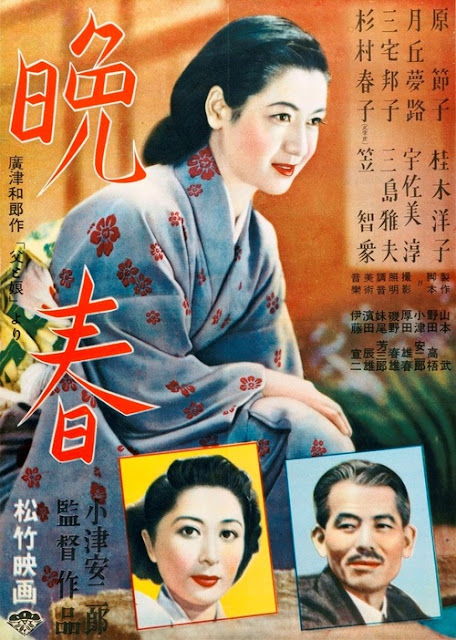Late Spring (Film Review)

1949 Sochiku
Directed by: Yasujirō Ozu; Written by: Kogo Noda and Yasujirō Ozu
Starring: Chishū Ryū, Setsuko Hara, and Haruko Sugimura
Running Time: 108 Minutes
The Nicsperiment Score: 10/10
Summer in the sweaty swamps of South Louisiana isn't fit for living. In the winter, the trees and grass die just to be good sports, but the air outside generally floats in the 60's. Spring, though, is absolutely beautiful, verdant life blooming in seemingly endless, pleasant breezes. Spring is my favorite season. Summer is just a 100-plus degree, seemingly 100-plus humidity white-out that can melt the brains right out of your head, an unpleasant roadblock on the way to football season, aka, autumn.
However, as I grew up, I learned that most other geographic locations treasure summer above all seasons, and consider it a time of outdoor fun for everyone...not an inhospitable pit of mosquitoes and discomfort. It seems that Late Spring's Noriko Somiya shares my seasonal preconceptions.
1949's Late Spring, generally considered one of director Yasujirō Ozu's many masterpieces, stars Setsuko Hara as Noriko, a woman in her late 20's who lives with her father, played by Chishū Ryū. The two have a rich and abiding relationship, full of love and care for one another. Much of Late Spring's first act involves Ozu's patented conversation shots, where Noriko and her father talk to one another by looking directly into the camera, one at a time. This creates the effect that the characters are talking directly to the viewer, and not only creates a sense of empathy and a bond with the audience, but in my case, quickly had me falling in love with these two characters. Indeed, most of these early conversations are full of pleasant smiles and the kind of shorthand small-talk only exchanged by two people who both know each other fully and fondly. A cinematic utopia is created where the father, a Professor, quietly goes about his scribing, and Noriko, recovering from trauma induced by the recently ended World War II, quietly assists. If only spring could last forever...
Apparently this phase of life isn't meant to last. Noriko's nosy Aunt Masa has decided that Noriko just can't go on living life without a husband, and that Noriko's father shouldn't be single either. Noriko isn't having it, but the Professor worries that he's holding Noriko back from a happy life. The thing is, Noriko is already quite happy, and wants a husband just as badly as I want to work outside at noon in a Louisiana August.
What unfolds is as natural as life. Ozu films in his minimalist, yet meticulous style, an ornate cinematic vase with etchings that seam simple on first glance, yet upon inspection unfold infinitely. Ozu never takes a side in Late Spring's narrative proceedings, never tells, only shows.
In modern America, it's easy to project and say, well of course Ozu believes Noriko should do what makes her happy. Not so fast! This is a Japanese film from 70 years ago! Ozu, in protest of encroaching American attitudes, may have felt the very opposite! However, the true sign of a master storyteller is the ability to clearly show what's happening, while letting the viewer make up their own mind as to how they feel about it. This is as masterful as it gets.
My personal feelings: cherish the spring. The summer is too damn hot.


Comments